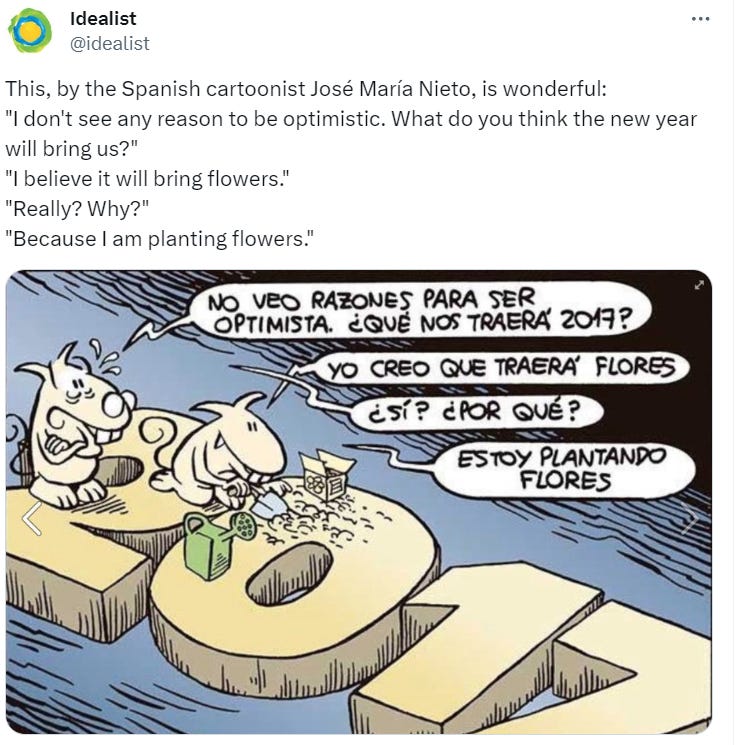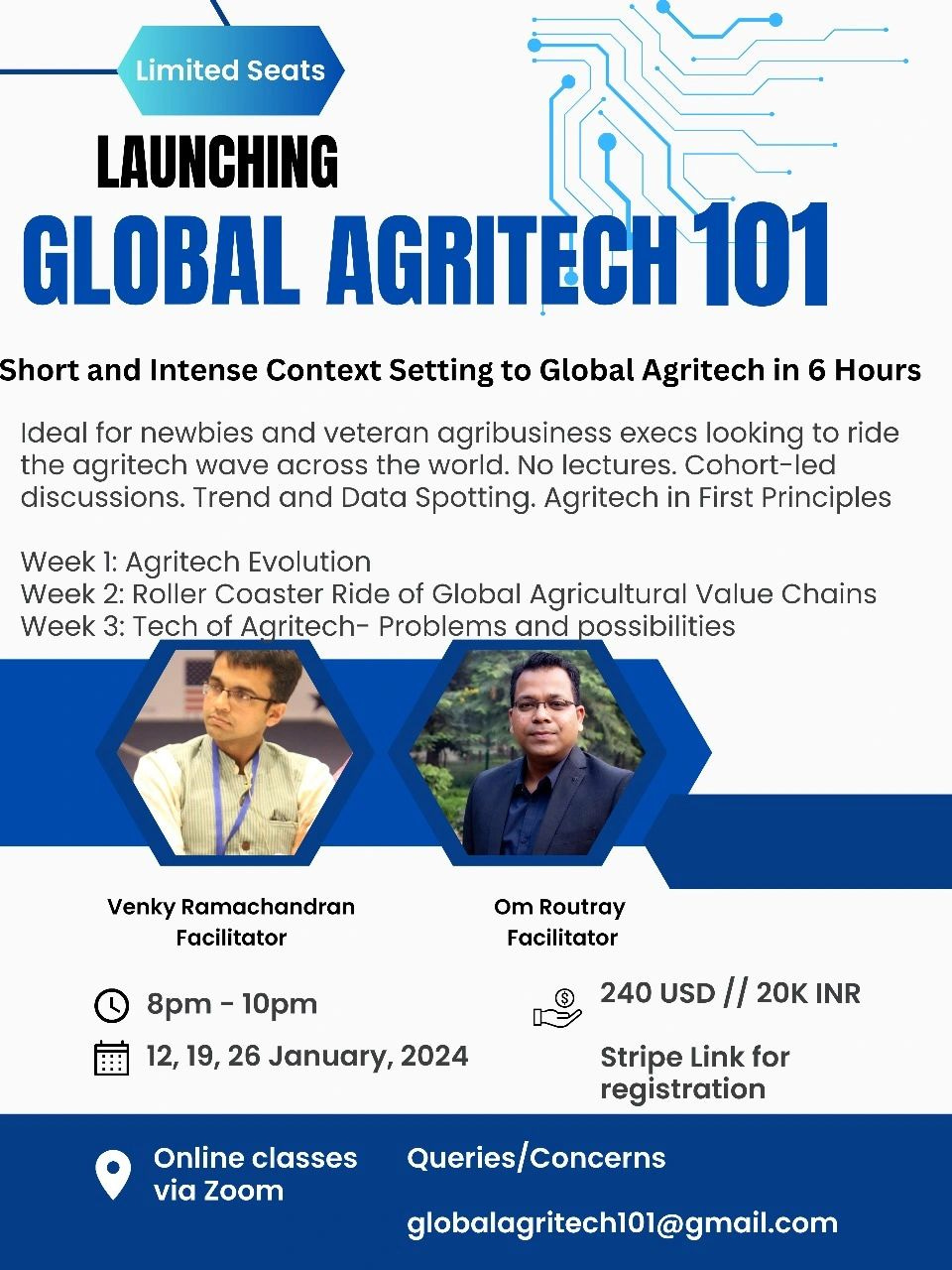Happy New Year 2024!
Two Updates: 1) Organizing my first offline Agritech Founders' Retreat 2) Launching Global Agritech 101 Course with Om Routray
Dear Friends,
Wishing you all a Happy 2024! Before I commence the 2024 programming schedule, I wanted to share two quick energizing updates!
As the world becomes entangled and ununderstandable and the grim, hot earth takes a toll of vengeance for our irrational exuberance, for those of us who work in food and agriculture systems, the bar for waking up every day with optimism has been rising higher and higher.
My fundamental yoga-inspired stance of optimism is succinctly summed up in this cartoon.
A stance of optimism is not a mask to be worn, in response to what is happening in the world outside.
It's a default stance that I discover every day inside, through my yoga practice, which shows me with breathful clarity that you need nothing, literally nothing, to be joyful and optimistic about the future.
What are the perks of discovering this inward optimism stance?
You don’t have to cherry-pick optimism from convenient data sets and ignore the inconvenient ones.
You don’t have to shoe-horn optimism just because you are in the business of Optimism-As-A-Service.
With that philosophical prologue in place, allow me to share a couple of energizing updates.
Offline Agritech Founders’ Retreat in Nashik, India
Along with a few Indian agritech entrepreneur friends, I am organizing on the 6th and 7th of January 2024, a two-day Agritech Founders Retreat in the grape City of Nashik- where the future of Indian Agriculture is quietly playing out in unevenly distributed terms. Around 15 founders from various parts of the country have signed up and we have planned two days of structured and unstructured learning and sharing.
Why are we doing this?
The challenges faced by agri founders are quite different from other founders. We are dealing with a sector that is slow to change for good and bad reasons. We are also dealing with a diverse variety of players and forces that are within and beyond our control.
The objective of the founders’ retreat is to exchange notes (sales, fundraising, marketing partnerships, hiring) and see where we could collaborate with other founders in safe, non-compete terms. Because you see, unlike other sectors, this market is extremely large enough to accommodate a variety of players.
My intent for the retreat is to see how we can create a more collaborative environment among agripreneurs. Right now, most of the agritech entrepreneurs whom I talk to want to do everything by themselves (“full stack” as we love to call it) which will unnecessarily take their energies on what their core focus is.
Given Agribusiness Matters’ focus on Systems Thinking, I am eager to cocreate ecosystem possibilities for founders to collaborate and tackle collectively the hard and wicked problems in food and agriculture systems.
On sunny days, I like to think of Agribusiness Matters as a meditation retreat for agritech founders, executives, and investors to pause, introspect, flex their thinking muscles, and ponder over the hard, wicked problems they encounter in their everyday working lives.
My aspiration for 2024 is to organize many such agritech founder retreats across the world where agritech founders can share their learnings and cocreate the beautiful food and agriculture systems we would love to build for our children.
If you wish to help me organize such retreats in your country and city or if you have better ideas to create ecosystems that can create more resilient food and agriculture systems, do ping me. Let’s talk.
<Announcement>Global Agritech 101 Course
When I entered the agritech sector in 2016, there was no one to orient me to the sector. Everyone kept talking about feeding 10 billion in 2050 and I naively believed those marketing messages.
Nobody told me that the precision agriculture wave began in the 1980s. Nobody told me that some of the agritech innovations we see are decades old. Nobody told me that the age of mechanization started in the 1700s when the horse-drawn seed drill was invented by Jethro Tull.
And so when Om Routray and I decided to design a "Global Agritech 101" course, we wanted to design a perfect industry primer that looks at possibilities and problems with equal honesty.
With Om Routray focused on the output side of the agricultural value chain and my focus on the input side of the agricultural value chain, we felt we could complement each other's strengths.
If I were to go back to 2016, what would I have wanted to know as I entered the industry as an outsider?
That's the question that drove me to design the course with Om. Much as I would have preferred for myself, we have minimized the “lecture” component and made it more “discussion” focused with mental models, first principles, and essential data sets that would help you see the trees and the forests simultaneously.
Why Global Agritech 101 and not Indian Agritech 101?
With Indian Agritech moving globally, we ought to have one global overview that looks at how the agritech market landscape is evolving (Session1), which agricultural value chains are ripe for disruption (Session 2) and what are the technological possibilities and challenges that await us (session 3)
In a sector like agritech, where those who get “agri” often don’t get “tech” and those who get “tech” don’t get “agri”, we wanted to design a short-and-sweet 6-hour industry primer that would perfectly bridge the possibilities of ‘tech’ with the challenges of ‘agri’ in an age of runaway Climate Change.
Date: 12th, 19th, 26th
Time: 8 PM to 10 PM IST (930 -1130 ET//630 -830 PST// 230-430 GMT)
You can pay and register here via Stripe or Razorpay (if you wish to pay via UPI)
That’s it, folks! See you all next week with regular programming!
So, what do you think?
How happy are you with today’s edition? I would love to get your candid feedback. Your feedback will be anonymous. Two questions. 1 Minute. Thanks.🙏
💗 If you like “Agribusiness Matters”, please click on Like at the bottom and share it with your friend.







